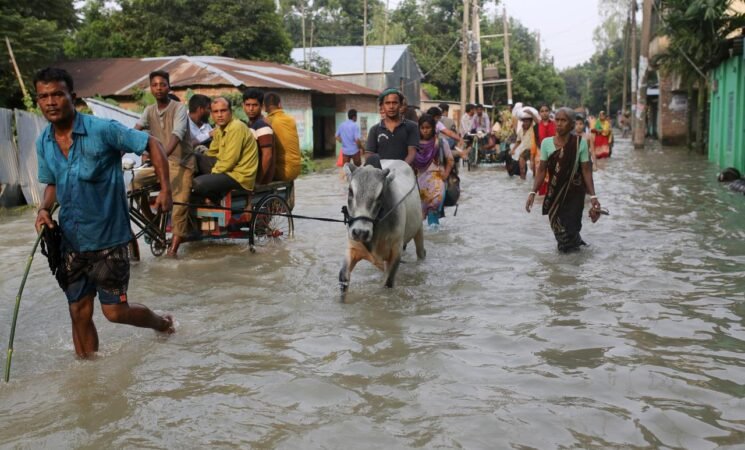10 October 2025, NIICE Commentary 11814
Danujaa Senthil Kumar
Bangladesh's story in the twenty-first century has been one of remarkable human and economic development, turning the country from a "basket case" into a new worldwide center for manufacturing. However, decades of advancement are being undermined by a quiet, smoldering crisis underlying the increasing tide of economic success. This issue is not political instability or currency devaluation, but extreme heat, a direct and measurable consequence of climate change that is now being quantified as a major economic drain.
The intensity of this situation was realized with the release of a World Bank report, “An Unsustainable Life: The Impact of Heat on Health and the Economy of Bangladesh", especially in September 2025 with the recent findings painting a clear picture: for Bangladesh, the devastating impact of global warming has transitioned from a theoretical threat into an immediate economic catastrophe.
The Alarming Surge in "Feels-Like" Temperature
The World Bank’s report, based on an analysis of temperature data from 1976 to 2023 and a massive 2024 household survey, reveals a trend far more alarming than simple maximum temperatures. While Bangladesh’s maximum temperature has climbed by 1.1 °C since 1980, the "feels-like" temperature, or heat index which accounts for punishing humidity has surged by a staggering 4.5 ℃ over the same period. This distinction is critical: it is the heat index, not the dry thermometer reading, that directly dictates human suffering and productivity loss.
Bangladesh is currently the second-most exposed country in the world to rising temperatures. Due to unrestrained urban development and the loss of green spaces and water bodies, Dhaka, the capital city, in particular, has turned into an unhealthy urban heat island, with its heat index growing 65% faster than the national average.
The Staggering Economic Toll
The economic fallout from this silent heat emergency is no longer speculative; it is an acknowledged fiscal burden on one of Asia’s fastest-growing economies. The World Bank estimates that in 2024 alone, heat-related illnesses and poor mental health cost the nation some 250 million workdays. Up to $1.78 billion, or around 0.4% of the nation's GDP for that year, was spent as a result of this loss of human productivity.
When compared to the current domestic economic challenges, this number is very noteworthy. According to the Bangladesh Bureau of Statistics' (BBS) official report for September 2025, the country's point-to-point inflation rate has increased to 8.36%. Importantly, for the 44th consecutive month, wage growth has fallen short of inflation, with the general wage growth rate falling to 8.02%. The economic strain of inflation is now made worse for millions of low-income workers, the exact individuals who are most exposed to outdoor heat, by lost productivity and missed workdays brought on by climatic stress. Recent progress in reducing poverty could be reversed by the combined strain.
Furthermore, the economic impact is projected to worsen with time. The World Bank warns that if global temperatures rise by 3 ℃ by 2030, Bangladesh could lose up to 4.9% of its entire GDP to extreme heat, a loss that could severely reverse the nation's development trajectory.
Heat’s Devastating Impact on Health and Human Capital
The report reveals that the economic losses stem directly from widespread physical and mental health crises. The increased heat is fueling a sharp rise in illnesses, particularly during the summer months. In terms of physical health, common seasonal illnesses are increasing significantly. For instance, the number of diarrhea cases and instances of a persistent cough effectively double during the warmer months compared to the winter. This is more than just discomfort; when the temperature climbs above 35 ℃, a worker’s chance of losing a day of work due to a physical illness jumps by approximately 48% (47.7% to be precise). This burden falls disproportionately on those who can least afford it, unskilled laborers and low-income workers are the hardest hit, as their jobs often require intense physical work outdoors or in uncooled environments, resulting in them losing significantly more workdays compared to higher-paid professionals who often work in air-conditioned offices.
The impact, however, is not just confined to the body; it is profoundly affecting the national mental health as well. Heatwaves are a major factor in the surge of mental health problems. The rate of depression among the population rises sharply from 16.2% in the winter to 20.0% in the summer. Similarly, anxiety disorders increase from 8.3% to 10.0%. For many individuals, the sheer intensity of the heat prevents adequate sleep, resulting in chronic sleep loss, constant exhaustion, and high levels of stress. This direct link between a sweltering environment and a decline in mental clarity and productivity has significant consequences for the workforce and the national economy
Furthermore, certain groups are identified as highly vulnerable including the elderly and women face a heightened risk, making them particularly susceptible to severe heat-related conditions like heat stroke and heat-induced exhaustion. This indicates that the current climate crisis is not affecting all people equally, compounding existing social and economic inequalities.
A Call for Coordinated Policy Action
The nation's economic defenses and health systems are severely ill-equipped for this increasing disaster, the World Bank emphasized. According to the research, which was co-authored by Senior Operations Officer Iffat Mahmud, heat is now a serious risk to human capital that requires a multi-sectoral, coordinated response. Some of the immediate and medium-term policy changes that the report recommended includes,
- National Heat Emergency Protocols
- Health System Reform
- Urban Greening and Planning
- Data-Driven Interventions
- International Climate Financing
For Bangladesh, sustaining its economic miracle is no longer just about trade deals and remittances, it's about fundamentally adapting to a warmer world, or watching the literal heat chip away at its human capital and prosperity. The time for the government to move from acknowledgement to urgent, comprehensive action is now.
Danujaa Senthil Kumar is a Research Intern at NIICE & is pursuing her Bachelor’s of Arts in Economics (Honours) at Mount Carmel College, Bangalore, India.

